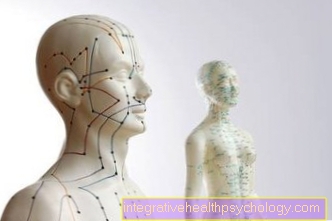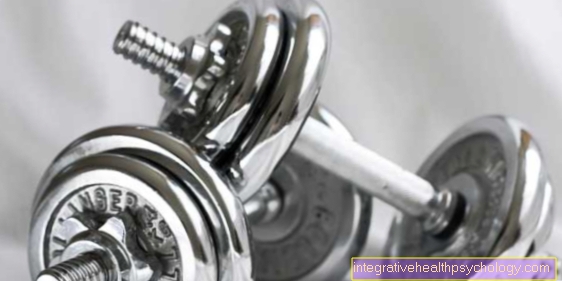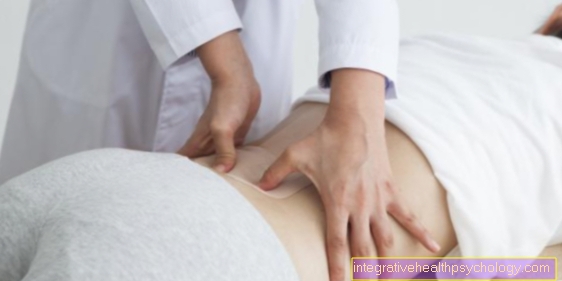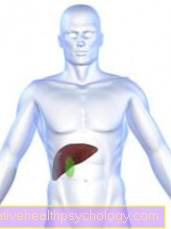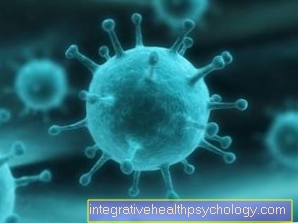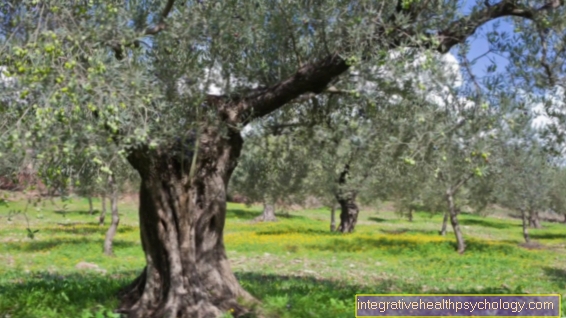Heart muscle thickening
introduction
A normal, healthy heart is about the size of a closed fist. However, it is with a heart muscle thickening enlarged, because it is a disease that is caused by a Thickening of the ventricular walls excels. It is also known medically as hypertrophic cardiomyopathy. Usually the heart is not evenly affected by the thickening because it becomes prefers the left ventricle thickened. This can different causes and, depending on their severity, have different consequences. Basically is between a physiological - that is, natural - heart muscle thickening very active people and a pathological - that is, pathological - heart muscle thickening caused by prolonged stress on the heart.
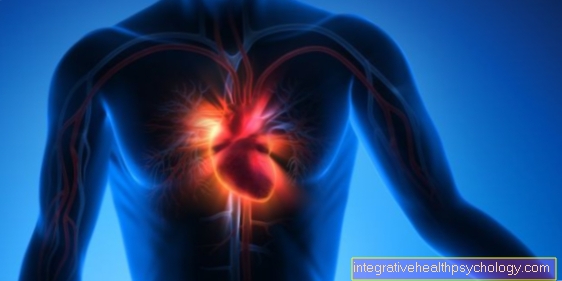
causes
The causes of cardiac muscle thickening are diverse. At very active people the heart thickens because it is used to pumping a lot and vigorously. Not only the skeletal muscles of the athlete, but also the heart stronger under physical exertion. This makes sense because the athlete's heart can subsequently transport more blood volume with fewer beats and thus in the Load situation works more efficiently.
However, the heart can move too pathologically enlarge. The most common cause this is more permanent high blood pressure. Also through a Narrowing of the aortic valve , this is the heart valve between the left ventricle and the main artery, (Aortic stenosis) there is a strong pressure increase on the heart muscle walls. This thicken compensatory. Usually only the left ventricle is affected.
Please also read our article on this Aortic stenosis
The thickens right ventricleso the most common causes for this are one Increased pressure in the pulmonary circulation, for example through various Lung disease, or one Narrowing of the pulmonary valve, the heart valve between the right ventricle and pulmonary artery.
Medically, two different forms of heart muscle thickening can be distinguished: the concentric shape and the eccentric shape. The concentric Heart muscle thickening is caused by pure pressure load, for example high blood pressure. The heart muscle walls thicken, so that the Reduced interior of the heart chambers. The Heart walls are due to the thickening stiffer and can no longer relax as well in the filling phase of the heart. This means that less blood flows into the heart. As a result, it can no longer throw out as much blood - the Pumping power becomes inefficient.
In the eccentric Heart muscle thickening is one Combination of pressure and volume loading in front. This happens, for example, when the Aortic valve leaking becomes (Aortic regurgitation). As a result, some of the blood that has been ejected from the heart will be used during the relaxation phase (diastole) flows back into the heart. As a result, there is an unnaturally high volume of blood in the heart chamber, which leads to the heart chamber walls being stretched. These thicken in a compensatory manner. Simultaneously practically wears out the chamber, that is that Ventricular volume enlarged themselves.
Symptoms
Through the insufficient pump performance, which results from the pathological thickening of the heart muscle, from a certain severity the patient feels a Reduction in performance. in the Initial stage However, the disease can also completely without symptoms expire, which explains why heart muscle thickening is common diagnosed late becomes. Come from a certain degree of expression shortness of breath, respectively Shortness of breath added. Also swollen legs (Edema), Chest pain (Angina pectoris), Cardiac arrhythmias, dizziness, respectively Syncope and feelings of weakness may occur. Those affected also have to urinate frequently at night. All of these symptoms are signs of a Heart failure.
Diagnosis
The heart muscle thickening can be caused by a Cardiologists to be established. The doctor will first look after the existing complaints inquire. These can already provide an indication of a cardiac cause. If there is a suspicion of a thickening of the heart muscle, one is usually first Echocardiography of the heart, so one Ultrasound examination. This shows whether the heart chambers are wider than usual. If there is still uncertainty or special questions, a Magnetic resonance imaging (MRI) to be ordered.
Therapy / treatment
The therapy of the heart muscle thickening depends on the identified cause. It is important to have one To prevent disease progression. As the most common cause one arterial high blood pressure (hypertension) is, blood pressure must optimally adjusted become. Various are suitable for this antihypertensive drugs, for example Beta blockers. The doctor will select a suitable preparation depending on the severity of the patient's hypertension and other illnesses.
The cause of the heart muscle thickening lies in one Valvular heart disease, for example a narrowing (Stenosis) or insufficient closing ability (insufficiency) of the aortic valve, a Heart valve surgery should be considered. This is also made dependent on the severity of the valve disease and the age of the patient. The faulty flap can, for example, by a mechanical or biological heart valve replaced become.
forecast
The heart muscle thickening is no curable disease. Since the mechanism of development is very complex and various factors contribute to it, it is not always easy to adjust, especially in the late stage. However, it will discovered in the early stages, can one appropriate medication and a adapted lifestyle the Progression the disease prevent, or slow down significantly. The Life expectancy is then not significantly reduced. A very heart muscle thickening diagnosed late, which has already manifested itself through a variety of symptoms, can, however, with severe complications go along and also to one sudden cardiac death to lead.
Sports
Patients with heart muscle thickening should Avoid excessive physical strain, because otherwise the heart is quickly overwhelmed. Competitive and competitive sports should not be practiced. Some athletes have already died of their heart muscle thickening in the meantime, even without first knowing about their illness. This is the tricky thing about heart muscle thickening. The first symptom the sudden cardiac death be. A heart muscle thickening can, however also arise through sport and have to not automatically pathological be. People who do a lot of physical activity do a lot of muscle work. The heart also pumps faster and more vigorously in order to supply the body with sufficient oxygen and nutrients. In the long run, the heart adjusts to the high load and thickens. This causes it work more efficiently under stress can. It can then pump more volume through the body with one heartbeat and therefore has to beat less overall. This is impressively demonstrated by the low resting heart rate of competitive athletes.
Heart muscle thickening due to high blood pressure
Heart muscle thickening can result from high blood pressure. High blood pressure (arterial hypertension) is the most common cause of the disease. 20-60% of patients with chronic high blood pressure develop a thickening of the heart muscle, which then particularly affects the left ventricle (left ventricular hypertrophy). Due to the constant pressure load, the heart adapts and thickens. The chamber size decreases so that the heart can fill up less. The thick wall of the heart muscle is no longer so elastic, which means that the heart can no longer relax as well during the relaxation phase. As a result, the heart's ejection performance decreases. The patient only notices this after a certain degree of severity. Initially, the disease can be symptom-free. Later on, complaints arise, especially under stress.
consequences
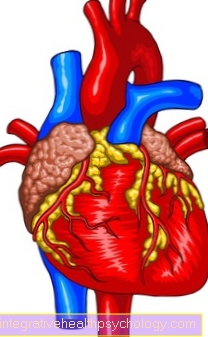
A heart muscle thickening is a Risk factor for various cardiovascular diseases, or various complications that can result from the heart muscle thickening. First it comes from a certain level the myocardial hypertrophy to a general Heart failure, the so-called Heart failure. In this state, the heart is no longer able to supply the body with sufficient blood and thus with oxygen and nutrients in all situations. In the beginning, patients experience one mainly under physical strain Performance kink, shortness of breath and Cardiac arrhythmias. If the disease is advanced, the symptoms can also appear at rest. The patients can then hardly be physically active, so it is often not even possible to climb stairs. Besides, that is risk, one Suffering from a heart attack, if the heart muscle is thickened. If a heart attack has occurred, it is often less tolerated by patients with heart muscle thickening than by patients with a heart attack without this disease.

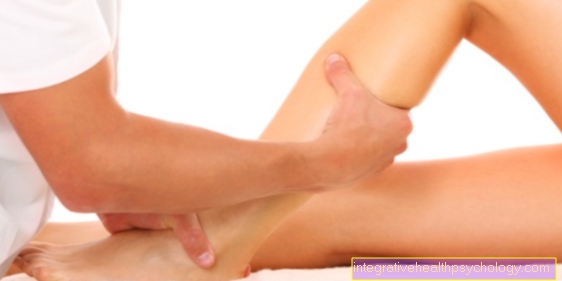
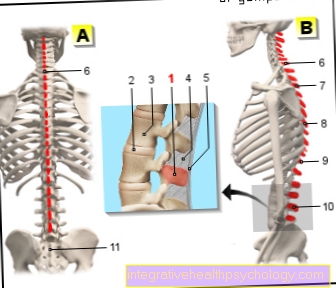
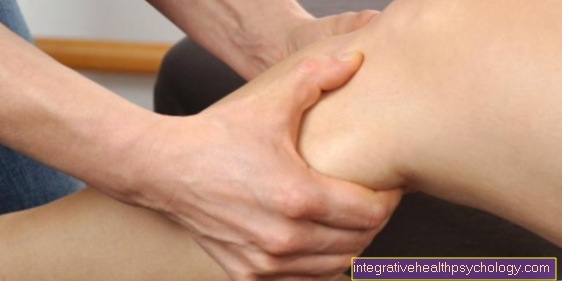



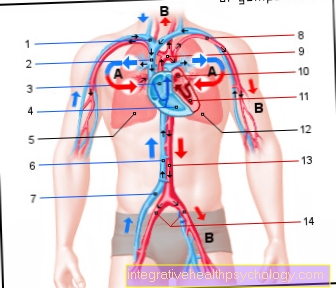


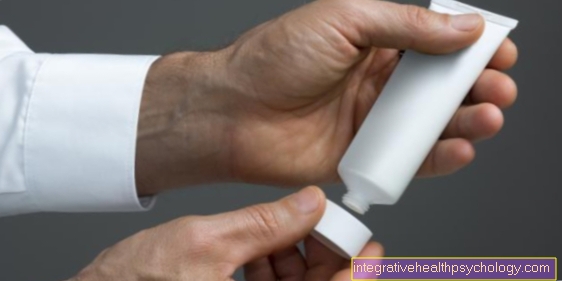


.jpg)
